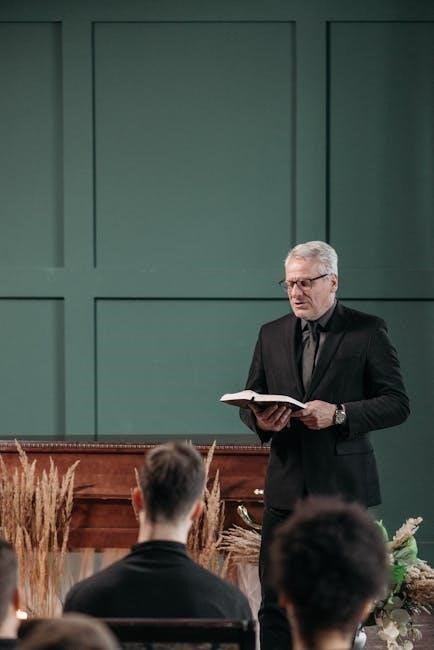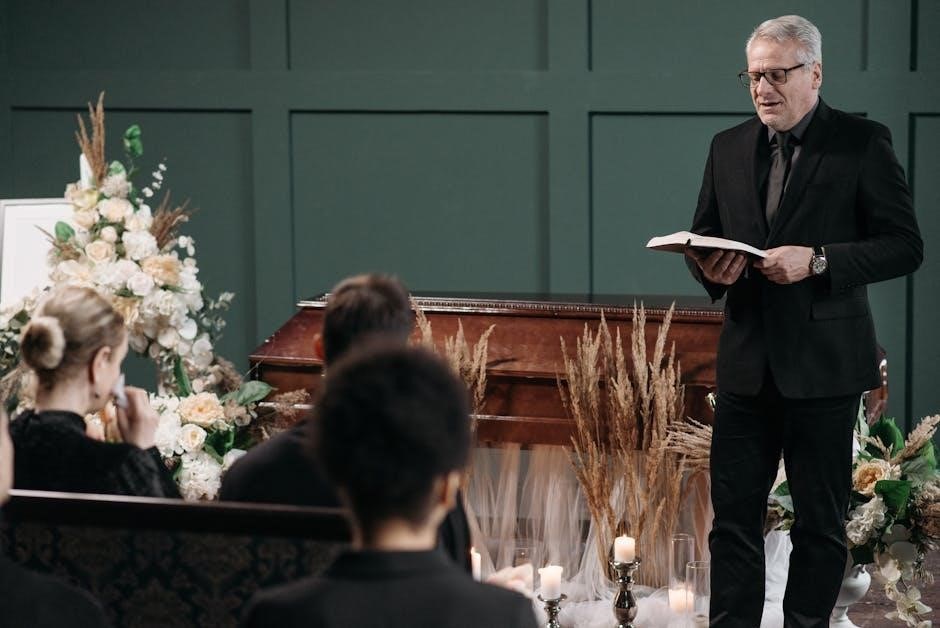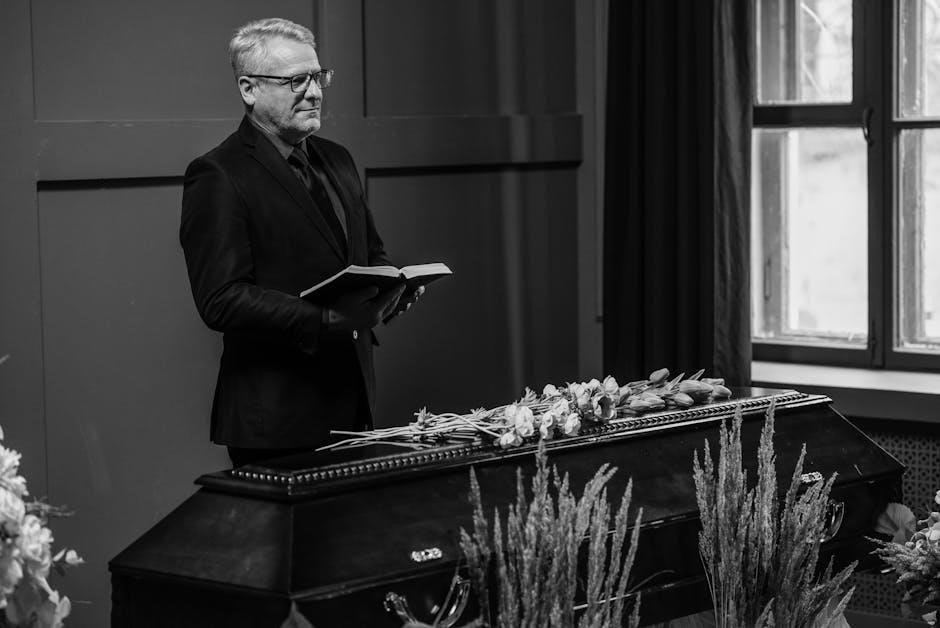This manual serves as a valuable resource for pastors, providing guidance on conducting funerals with compassion, dignity, and theological depth, ensuring meaningful pastoral care during bereavement.
1.1 Importance of a Comprehensive Funeral Guide for Pastors
A comprehensive funeral guide is essential for pastors to navigate the complexities of funeral ministry with confidence and compassion. It ensures dignity, theological integrity, and emotional support for grieving families, providing clear structure and practical wisdom for pastors to fulfill their role effectively during such sacred moments.
1.2 Overview of Key Topics Covered in the Manual
This manual covers essential topics such as funeral preparation, service structure, emotional support for grieving families, and post-funeral care. It also includes practical resources like checklists, recommended scriptures, and cultural considerations, ensuring pastors are well-equipped to provide compassionate and meaningful ministry during difficult times.

Preparing for the Funeral
This section guides pastors through initial consultations, understanding the deceased’s background, and coordinating logistics with families, funeral homes, and churches to ensure a meaningful and honoring service.
2.1 Initial Consultation with the Family
The pastor meets with the family to discuss their needs, preferences, and the deceased’s wishes, ensuring a personalized funeral service. This consultation builds trust and provides emotional support, helping the family navigate their grief while planning a meaningful celebration of life. Open communication is key to understanding their expectations and offering guidance.
2.2 Understanding the Deceased’s Background and Wishes
The pastor gathers insights into the deceased’s life, interests, and spiritual journey to honor their legacy. Respecting their wishes and cultural practices ensures a meaningful service. This understanding guides the pastor in creating a personalized ceremony that reflects the individual’s character and faith, bringing comfort to the grieving family.
2.3 Coordinating with the Funeral Home and Church
Effective communication between the pastor, funeral home, and church ensures a seamless service. Confirming details like casket placement, service order, and logistics with both parties is essential. This collaboration honors the deceased and supports the grieving family, creating a respectful and meaningful experience.

Conducting the Funeral Service
The pastor leads the service with dignity, ensuring respect for the deceased and comfort for the family, while guiding mourners through prayers, scriptures, and eulogies.
3.1 Structure of a Typical Funeral Service
A typical funeral service includes an opening prayer, scripture readings, a eulogy, a message of hope, and the committal service. The pastor guides the flow, ensuring a balance of comfort, reflection, and spiritual encouragement, while respecting the family’s wishes and cultural traditions.
3.2 Leading Prayers and Scripture Readings
The pastor guides the service with heartfelt prayers and meaningful scripture readings, ensuring comfort and hope for the family. Selections often include Psalms, hymns, and New Testament passages, providing solace and reflecting the deceased’s faith. These elements help the family and attendees find strength in their grief.
3.3 Delivering the Eulogy and Message of Hope
The eulogy honors the deceased’s life, sharing memories and character traits. The pastor’s message of hope focuses on resurrection and eternal life, offering comfort and assurance to the grieving family and congregation, while emphasizing God’s love and grace in times of sorrow.

Handling Emotions and Grief
Pastors play a vital role in providing emotional and spiritual support, helping the bereaved navigate grief while offering comfort, presence, and guidance rooted in faith and compassion.
4.1 Providing Pastoral Care to the Bereaved Family
Pastors offer compassionate support to grieving families through active listening, prayer, and sharing scripture. They provide guidance on funeral planning, helping families honor their loved one while navigating their emotional and spiritual needs with empathy and grace, ensuring a meaningful and comforting experience during a difficult time.
4.2 Managing Personal Emotions as a Pastor
Pastors must balance their emotional responses with professional compassion, ensuring they remain composed while empathizing with the bereaved. Self-care practices, prayer, and seeking support from colleagues or mentors help pastors maintain emotional resilience, enabling them to minister effectively without becoming overwhelmed by the sorrow they encounter.
4.3 Creating a Safe Space for Grieving
A pastor fosters a safe environment by actively listening, offering comforting words, and ensuring confidentiality. This space allows mourners to express emotions freely, promoting healing and trust, while respecting cultural and personal preferences to provide meaningful support during their time of sorrow.

Cemetery and Burial Procedures
Pastors lead the procession to the gravesite, conduct the committal service, and ensure dignity and respect throughout the burial process, providing a meaningful conclusion to the funeral rites.
5.1 Leading the Procession to the Gravesite
The pastor guides the procession to the gravesite, maintaining a solemn and reverent atmosphere. They ensure the casket or urn is respectfully transported, followed by the family and mourners, setting the tone for the committal service with dignity and compassion, reflecting the sacred nature of the occasion.
5.2 Performing the Committal Service
The pastor conducts the committal service with reverence, leading prayers and reciting Scripture to honor the deceased. They ensure the service reflects dignity and comfort, offering a final farewell as the body is laid to rest, providing solace to the grieving family and emphasizing eternal hope in Christ.
5.3 Ensuring Dignity and Respect at the Gravesite
The pastor leads the procession to the gravesite, ensuring decorum and respect. Standing at the head of the casket, they guide the family through the final rites, maintaining dignity and offering comfort. The service reflects reverence, honoring the deceased while providing solace to mourners.

Post-Funeral Care and Follow-Up
Pastors provide ongoing emotional and spiritual support to grieving families, ensuring their needs are met beyond the funeral. Follow-up visits and prayerful presence foster healing and comfort.
6.1 Providing Ongoing Support to the Family
Pastors play a vital role in offering continuous emotional and spiritual support to families after the funeral. This includes regular visits, prayer, and counseling, helping them navigate grief while fostering a sense of community and connection during their healing journey.
6;2 Documenting the Funeral Service
Accurate documentation of the funeral service is essential for maintaining records and providing a lasting tribute to the deceased. This includes noting the order of service, eulogies, and attendee lists, ensuring a respectful and organized archive for future reference and reflection.
6.3 Debriefing and Reflecting on the Experience
Following the funeral, pastors should engage in a debriefing session to reflect on the service and their role. This reflection helps identify areas for improvement and provides an opportunity for emotional and spiritual renewal, ensuring continued effectiveness in pastoral ministry and personal growth.

Funeral Traditions and Cultural Sensitivity
Understanding and respecting diverse religious and cultural practices is crucial for pastors to provide meaningful funeral services, ensuring traditions are honored while sharing the Gospel of hope;
Pastors must be well-versed in various religious and cultural traditions to conduct funerals respectfully. This includes recognizing rituals, symbols, and customs specific to different faiths, ensuring services are meaningful and sensitive to the family’s background, while maintaining a focus on providing comfort through faith and compassion. A pastor should tailor each funeral service to reflect the family’s unique requests and cultural background. This involves incorporating personalized elements such as specific hymns, readings, or rituals, ensuring the service honors the deceased and provides comfort to mourners while staying true to spiritual principles and traditions. Pastors must honor the cultural and religious traditions of the family while seamlessly integrating the Gospel message. This balance allows the funeral service to serve as both a celebration of life and a proclamation of hope through faith, ensuring comfort and spiritual nourishment for all attendees. This section provides essential tools, including recommended scriptures, prayers, and planning worksheets, to help pastors effectively prepare and conduct meaningful funeral services with confidence and compassion. This section offers a curated list of comforting scriptures and prayers tailored for funeral services, providing spiritual support and hope to grieving families. Include popular passages like Psalm 23 and John 14:1-6, along with heartfelt prayers for comfort, healing, and remembrance. These practical tools help pastors organize funeral details, ensuring nothing is overlooked. Worksheets cover key elements like hymns, readings, and eulogy points, while checklists guide logistical preparations. They enable personalized services, honoring the deceased while supporting the grieving family with thoughtful and comprehensive planning. This section offers a curated list of sacred hymns and appropriate musical selections. These choices provide comfort and reflection, aligning with the emotional and spiritual needs of mourners. They enhance the service, creating a meaningful tribute that honors the deceased and brings solace to the congregation. Pastors often face emotional and ethical challenges, such as navigating difficult family dynamics, balancing compassion with professionalism, and addressing moral dilemmas while maintaining dignity and integrity. Pastors must approach family conflicts with empathy, ensuring respectful communication and active listening. Balancing professionalism with compassion helps mediate disputes while maintaining dignity. Prayer and discernment guide decisions, fostering unity and honoring the deceased’s legacy amidst challenging circumstances. Pastors must maintain professionalism while offering heartfelt compassion, ensuring families feel supported without emotional overinvestment. This balance fosters trust and provides a stable presence during grief, allowing pastors to minister effectively while preserving their own emotional well-being for continued service. Prayer and self-care are essential in sustaining this equilibrium. Pastors face ethical dilemmas, such as navigating cultural practices or family conflicts. Respecting traditions while staying true to gospel principles requires discernment. Seeking guidance from scripture, prayer, and fellow ministers ensures decisions align with ethical standards, maintaining integrity and compassion in funeral ministry. This manual equips pastors to minister with hope and compassion, emphasizing the importance of self-care and continuous learning to effectively serve grieving families with grace and integrity. The pastor’s role is to offer spiritual guidance, comfort, and hope during funerals, helping families navigate grief while sharing the promise of eternal life through Christ, providing a compassionate and steady presence in their darkest moments, and ensuring the service honors both the deceased and the family’s faith. Pastors must prioritize self-care to maintain emotional and spiritual resilience, as repeated exposure to grief can lead to burnout. Setting boundaries, seeking support networks, and engaging in personal reflection are essential to sustain effectiveness in ministry and ensure long-term well-being while serving others in their darkest hours. Ongoing education and self-improvement are vital for pastors to refine their funeral ministry skills. Engaging in seminars, reading relevant literature, and seeking mentorship ensure they remain equipped to address diverse needs and provide compassionate, culturally sensitive care, enhancing their ability to bring hope and comfort to grieving families effectively.7.1 Understanding Different Religious and Cultural Practices
7.2 Adapting the Funeral Service to Meet Family Needs
7.3 Respecting Traditions While Sharing the Gospel

Funeral Service Tools and Resources
8.1 Recommended Scriptures and Prayers for Funerals
8.2 Funeral Planning Worksheets and Checklists
8.3 Suggested Music and Hymns for Funeral Services

Challenges and Ethical Considerations
9.1 Navigating Difficult Family Dynamics
9.2 Balancing Professionalism with Compassion
9.3 Addressing Ethical Dilemmas in Funeral Ministry
10.1 The Pastor’s Role in Bringing Hope and Comfort
10.2 The Importance of Self-Care in Funeral Ministry
10.3 Continuous Learning and Growth as a Funeral Minister